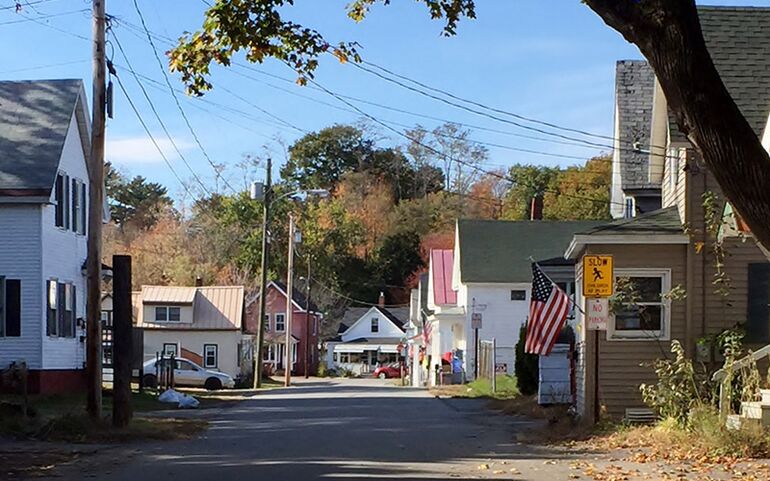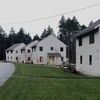Processing Your Payment
Please do not leave this page until complete. This can take a few moments.
- News
-
Editions
View Digital Editions
Biweekly Issues
- December 1, 2025
- Nov. 17, 2025
- November 03, 2025
- October 20, 2025
- October 6, 2025
- September 22, 2025
- + More
Special Editions
- Lists
- Viewpoints
-
Our Events
Event Info
Award Honorees
- Calendar
- Biz Marketplace
Mainers like where they live, but not condition, cost of home, survey says
 Photo / Maureen Milliken
Cost and condition are the biggest factors for those dissatisfied with their housing situations, a MaineHousing report found, though most are happy with location.
Photo / Maureen Milliken
Cost and condition are the biggest factors for those dissatisfied with their housing situations, a MaineHousing report found, though most are happy with location.
The cost and condition of housing are the two biggest issues Mainers who aren't satisfied with their housing have, and nearly a quarter of those who aren't happy with cost took on a second job in the past year to help cover housing bills, a survey by MaineHousing found.
Nearly three-quarters of those surveyed, however, like where they live and almost half say they plan to stay there after they retire, according to the survey, which focused on those dissatisfied with some aspect of their housing.
“It is clear from the results of the survey that housing affordability is more than just the amount a family pays in rent or mortgage," said Dan Brennan, director of MaineHousing, which is the state's housing authority. "Property taxes, maintenance and energy-related costs also stress households’ finances."
Brennan told Mainebiz that it's "clear that solving Maine’s housing affordability challenges will take a range of solutions and partnerships — and encourages us to continue to work hard to create programs that respond to Mainers’ needs.”
The survey was part of the authority's consolidated planning process. MaineHousing has to submit a comprehensive plan to the U.S. Department of Housing and Urban Development every five years and this year's process has also included public meetings across the state on affordable housing issues.
"But, it’s also a good opportunity to see what the general perception is out there and what people are really experiencing, so we can make sure that our programs are actually helping as much as they can," said Cara Courchesne, MaineHousing communications coordinator.
She said while it's also part of what MaineHousing sends to HUD, "In some cases, we’ve realized that we need to either up the marketing on one part of a program — for instance, talking about our First Home Loan with new Mainers — or make changes to others."
Those responding to the survey believe lowering property taxes and providing more incentives for energy efficiency will make their home more affordable, as well as community solutions like allowing more people to work at home and providing more affordable housing, though they draw the line at affordable housing developments of more than 20 units.
Levels of dissatisfaction
Some 1,758 Maine residents were contacted for the survey, conducted by Portland Research Group. Those taking part in the full survey had to be dissatisfied with at least one aspect of their housing: affordability, condition or location. Of the 1,758 people contacted, 43% were satisfied with all aspects of their current housing situation; 1,010 participated in the full survey.
An additional section on preferences for housing during retirement will help support short and long-term strategic planning, the report said.
Among those who completed the full survey, 78% own a single-family home, mobile home or condominium, and the rest rent.
Of the initial 1,7581 contacted:
- 76% said they are satisfied with the location of their home; 19% were neutral; 5% were dissatisfied.
- 64% said they're satisfied with the affordability of their home; 29% were neutral; 9% were dissatisfied.
- 62% said they're satisfied with the condition of their home; 31% were neutral; 7% were dissatisfied.
- Of the 1,010 who were dissatisfied with some aspect, 20% were unhappy with condition only, 19% with affordability only and 19% a combination of condition, affordability and location.
- Only 8% were unhappy with location alone, with the rest dissatisfied with a combination of location and one of the other factors, including: 18% affordability and condition; 9% condition and location; 7% affordability and location.
Affordability
Of the 1,010 who participated in the full survey, the average mortgage or rent on a primary residence is $624 a month, and the average monthly cost of property or real estate taxes is $447; utilities $277; general maintenance $219; and insurance $109.
Younger, renting, middle-income households reported spending the most on housing.
Asked to rank government initiatives on a scale of 1 to 10 for effectiveness at lowering costs, 55% of those responding said decreasing property taxes would be the most effective. Energy efficiency initiatives were next at 48%, followed by more financial assistance to pay for heat, at 42%
Less popular incentives were: more financial help for home buyer, 39%; financial assistance to pay for needed repairs, 38%; a requirement that a percentage of new homes being built be affordable, 36%; more financial assistance to renters, 28%; incentives to builders to construct more housing, 26%; incentives for downsizing, 22%; changes to zoning and codes, 17%.
The region in the state with the most affordability dissatisfaction was York and Cumberland counties, where 68% of those surveyed said they are "less than satisfied." Kennebec and Somerset counties were 65%; Hancock, Washington, Piscataquis, Penobscot, 64%; Aroostook, Waldo, Knox, Lincoln, Sagadahoc, 61%; Androscoggin, Franklin, Oxford, 58%.
Other affordability findings:
- 48% percent of respondents indicated that finding quality affordable housing has become more or much more difficult over the last three years.
- 32% of those less than satisfied with affordability pay nothing in property taxes. "The majority of these are likely renters who do not understand that part of their rent pays property taxes," the report says.
- 24% of those less than satisfied had to find additional employment to afford their housing costs.
Condition
Respondents on average spend $1,545 annually for routine repairs on their primary residence. Those who say the condition of their home is the biggest area of dissatisfaction say the cost of heating fuel is the biggest concern.
Of responders who said condition is the primary concern, 72% are from Androscoggin, Frankllin and Oxford counties; 70% from Kennebec and Somerset counties; 66% Waldo, Knox, Lincoln and Sagahoc; 64% Hancock, Washington, Piscataquis and Penobscot; 63% Aroostook; 60% Cumberland and York.
Other findings:
- 28% pay $1,000 to $4,999 a year in general maintenance, including painting, plumbing, roofing and electrical work, with the average of all respondents $1,545.
- 17% say the most urgent issues are exterior repairs, followed by interior repairs, 11%; electrical work, 9%; plumbing 8%; landscaping, 7%; heating, 7%.
- 30% say they or someone else in their home was cold because of fuel costs; 16% say they were cold because of heating system issues.
Location
Of those unhappy with location, the greatest number was in Androscoggin, Franklin and Oxford counties, at 48%. That was followed by Aroostook, Hancock, Washington, Piscataquis and Penobscot, 47%; Kennebec and Somerset, 44%; Waldo, Knox, Lincoln, Sagadahoc, 38%; Cumberland and Waldo, 33%.
Other finding:
- Both owners and renters are more satisfied with location compared to its condition or affordability.
- Those who want to relocate want to be closer to services and amenities, 53%, or want a smaller more affordable home, 25%.
- 54% of respondents found being closer to a grocery store/pharmacy an important consideration when moving.
- 40% of those who want to move can’t because they can’t afford moving costs
- Those who want to relocate in Maine, but outside their current community or area, prefer Cumberland, Sagadahoc and York counties.
Retirement
Almost half of those responding — 46% — said they plan to stay in the residence they're in now when they retire. Some 83% said they'd rather own a home than rent in retirement.
Of those who want to live somewhere, 20% would live somewhere else in the U.S.; 12% would stay in the community they're in now, but not in the same home; 10% said in the same county, but not necessarily the same community; 10% said in a different county; 2% said outside of the U.S.
The biggest support they anticipate needing is volunteers to help with home maintenance, at 28%; 23% say they'd need help with transportation as well as in-home health services; 22% said they'd need visits from people besides family and friends.
Mainebiz web partners

The Giving Guide
The Giving Guide helps nonprofits have the opportunity to showcase and differentiate their organizations so that businesses better understand how they can contribute to a nonprofit’s mission and work.
Learn More
Work for ME
Work for ME is a workforce development tool to help Maine’s employers target Maine’s emerging workforce. Work for ME highlights each industry, its impact on Maine’s economy, the jobs available to entry-level workers, the training and education needed to get a career started.
Learn More
Groundbreaking Maine
Whether you’re a developer, financer, architect, or industry enthusiast, Groundbreaking Maine is crafted to be your go-to source for valuable insights in Maine’s real estate and construction community.
Learn more-
The Giving Guide
The Giving Guide helps nonprofits have the opportunity to showcase and differentiate their organizations so that businesses better understand how they can contribute to a nonprofit’s mission and work.
-
Work for ME
Work for ME is a workforce development tool to help Maine’s employers target Maine’s emerging workforce. Work for ME highlights each industry, its impact on Maine’s economy, the jobs available to entry-level workers, the training and education needed to get a career started.
-
Groundbreaking Maine
Whether you’re a developer, financer, architect, or industry enthusiast, Groundbreaking Maine is crafted to be your go-to source for valuable insights in Maine’s real estate and construction community.
ABOUT
NEW ENGLAND BUSINESS MEDIA SITES
No articles left
Get access now
In order to use this feature, we need some information from you. You can also login or register for a free account.
By clicking submit you are agreeing to our cookie usage and Privacy Policy
Already have an account? Login
Already have an account? Login
Want to create an account? Register
Get access now
In order to use this feature, we need some information from you. You can also login or register for a free account.
By clicking submit you are agreeing to our cookie usage and Privacy Policy
Already have an account? Login
Already have an account? Login
Want to create an account? Register







0 Comments